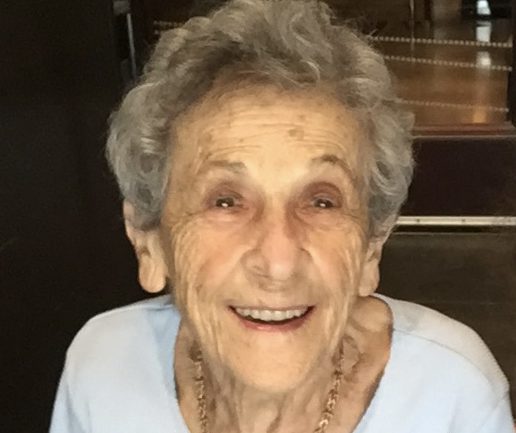Frieda Wertman died June 25, 2022, in Vancouver at the age of 96. Her granddaughter Becca Wertman-Traub recalls the lessons that she learned from her.
I grew up knowing that both of my grandparents, my Babi, Frieda Wertman, and my Zaida, George Wertman, were Holocaust survivors. Zaida would tell me his stories—about surviving the forced labour camp of Camp Winniki, escaping during its liquidation, and then hiding in a secret room where Nazis were just living on the other side. I know the details of how he escaped death countless times backwards and forwards from how he spoke about them.
But my Babi, who was just 13 when the Second World War began, did not really tell her stories.
She did talk about her brother—Shaike—who was taken to his death by the German SS when he came out of the house to help his young sister carry a pail of water. He was taken to a police station and killed in its basement along with numerous other Jews from the town.
And she told us that her father, mother, sister, and another brother all perished in the Holocaust.
But there was not much else. She was too busy making blintzes, pirogies, chicken patties, chicken soup with kreplach, and more for her family for stories of death and tragedy to be important.
Thankfully, she did have the extreme courage to tell her full story to the University of Southern California Shoah Foundation, where I learned the details of how she survived.
Babi’s childhood home in Kamionka Strumilowa, Poland, became part of a ghetto. During the liquidation of the ghetto, she and her brother, sister, and mother hid in a space in the wall and managed to survive when the rest of the Jews of the town were taken to their deaths at Belzec extermination camp.
Following the liquidation, the German’s declared the town “Judenfrei”—free of Jews, but Babi and her remaining family were still there. Since their home was located on the edge of the ghetto, they jumped off the balcony, passing the ghetto’s fence, and walked to Busk, a town 30 km away where they had heard that Jews were still living.
They went to the Busk ghetto and lived with an aunt. Babi’s mother died of typhoid in the ghetto. So, Babi was left with her brother and sister. Unannounced, the Germans started to liquidate the ghetto, and Babi again hid but was separated from her brother and sister. She never saw them again.
While in the Busk ghetto, Babi worked as a gardener for a man who mentioned that if she returned to Kamionka Strumilowa, he would help to hide her. At the time, Babi did not believe such a thing was possible and simply mentioned it to her cousins.
However, after the liquidation of the Busk ghetto and all alone, she decided to give it a shot and walked back to her hometown by herself. The man took her to the village of Obydiv, where she met Mr. Svets, a Polish farmer.
Babi hid in this farmer’s barn for 12 months, along with her cousins who had jumped off a train on its way to Belzec. Today, the farmer’s sister-in-law, Janina Pelc, is listed among Yad Vashem’s Righteous Among the Nations.
Babi was one of just 20 from a town of 3,000 Jewish people who survived the Holocaust and lived to tell her story.
And did she live!
She and my Zaida met after the war and moved to Vancouver in 1949 and never looked back, understanding how fragile life is and the importance of not wasting it.
Babi was always walking, or speed walking, usually leaving my Zaida behind so she could do laps back and forth around him. She never sat still, whether it was cooking for her three children – Toni, Annette, and Charles—and later eight grandchildren—Zachary, Sara, Jesse, Micah, Adena, Jared, myself (Becca), and Bradley—or cleaning the entire kitchen with a single square of paper towel because there could never be any waste.
I remember sitting at Babi and Zaida’s kitchen counter as a little kid and Babi giving me milk in a tiny shot glass because “if you finish this you get some more.”
She played tennis at the Richmond Country Club, exercised at the Vancouver Jewish Community Centre, and was a regular at many of the finest restaurants and cafes in downtown Vancouver.
And even when my Zaida passed away, she still was not done living. Right up until the end, my dad took her out for coffee.

In September, just a few days before my wedding, we were out for coffee, and she took my left hand, glanced at my engagement ring, looked at me, and said “is he Jewish? Is he from a good family?” I said yes and reminded her that she was coming to the wedding.
At 95, she not only came to my wedding, but she danced at it, to none other than Od lo ahavti di—Hebrew for “I have not yet loved enough.”
She appreciated life and everything it had to offer to its fullest, never allowing any of its gifts to go to waste. We mustn’t either.
May her memory be for a blessing.
Becca Wertman-Traub is the Director of Research at the Centre for Israel and Jewish Affairs (CIJA). Becca grew up in Vancouver and currently lives in Jerusalem.









